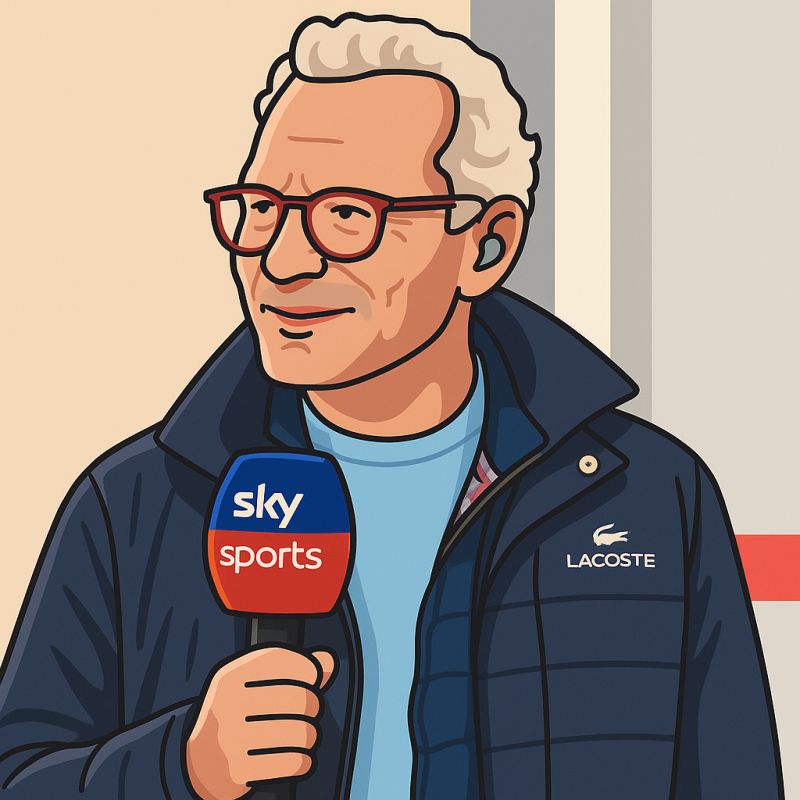Jacques Villeneuve has never been shy about dropping a grenade into an F1 debate, and he lobbed another one on Sky Sports F1 as the championship rolled back from its summer break: scrap the mirrors.
The 1997 World Champion argued that modern drivers lean on their mirrors to block rather than race, and that taking them away would force cleaner, more responsible fights on track. It came up during a Sky discussion revisiting that Verstappen–Hamilton flashpoint in Hungary, the one that went to the stewards and came to nothing, but stirred plenty of conversation about defensive driving standards.
Back in Villeneuve’s day, he says, mirrors were barely useful anyway. You didn’t rely on them to manage a battle; you kept your line, you left room when it was earned, and you assumed the car ahead hadn’t clocked you unless you were clearly alongside. In his view, today’s wide, aerodynamically sculpted mirror pods have become tools for reacting to an attack rather than concentrating on the corner in front.
His logic is blunt: take away mirrors and drivers won’t place their cars in the no-man’s-land of “half a front wheel alongside” and expect the other guy to yield. They’ll commit only when the move’s on, and the car in front won’t drift across on the assumption they’ve got eyes in the back of their head. Fewer elbows out, fewer late swerves, better racing. Safer, even.
There’s a caveat, Villeneuve admits. Pit exits get trickier. But he insists the net effect would still be positive in wheel-to-wheel combat. It’s not a fresh crusade either. He pitched the same idea during his BAR stint in 2003 and, by his own telling, was met with laughter. Two decades on, the line hasn’t softened.
The Canadian went further this time, broadening it to a wider reset: less radio, less telemetry, more feel. Strip back the coaching, hand responsibility back to the cockpit. And if you’re wondering who he thinks would thrive under that regime, he did name one driver: Max Verstappen. Villeneuve’s view is that Verstappen already drives on instinct and feedback as much as anyone on the grid, and would only pull clearer under looser electronic oversight.
Will any of this actually happen? The FIA’s safety framework is built on visibility and predictability, and mirrors are part of that. The rulebook mandates rearward vision; teams spend wind tunnel time shaping mirror housings that both satisfy the regulations and soothe the airflow. Removing them would be a seismic shift, not a Saturday tweak. So, no, don’t expect parc fermé to sprout blank stalks anytime soon.
But Villeneuve’s provocation taps into a real tension. Drivers know where rivals are thanks to mirrors, radio calls, delta displays and truckloads of data. It makes them bolder in marginal scenarios, which sometimes look like inch-perfect racecraft and sometimes like two cars trying to occupy the same curb. The Hungarian flashpoint – like so many before it – was born in that grey zone between “he’s earned the corner” and “he’s chancing it.” Villeneuve’s solution simply tries to erase the grey.
As the paddock sets up at Zandvoort, it’s the sort of conversation that ripples through engineering briefings and drivers’ rooms, even if only as a thought experiment. Would removing mirrors actually dial down the gamesmanship or just shift it? Would drivers become more cautious on entry or more abrupt on exit? And what happens in traffic when you’re relying solely on spatial awareness while sitting low in a car with a halo and fat rear tyres blotting out half the world?
It’s easy to dismiss Villeneuve’s stance as contrarian for contrarian’s sake. It’s also hard to argue he doesn’t have a point about intent. Mirrors used to be the last check; now, at times, they look like the first tactic. His “get rid of them” line is extreme, but it needles the sport where it’s sensitive: the balance between hard, fair defending and choreographed blocking that leaves stewards parsing replays at sunset.
Villeneuve’s been consistent on this for years. He’s not asking for nostalgia; he’s asking for accountability. Drive your car. Commit to your line. If you haven’t earned overlap, don’t force it. If you’re ahead, don’t play the rear-view chess match. Whether you agree or not, you can’t say it’s boring television.
Just don’t expect the rulemakers to run with it. Mirrors, like the radio and telemetry he’d also trim, are embedded in how Formula 1 operates and governs safety. But as a nudge to the culture of racing, Villeneuve’s mirrorless manifesto does what a good pundit’s jab should do: start an argument that lingers long after the chequered flag.




